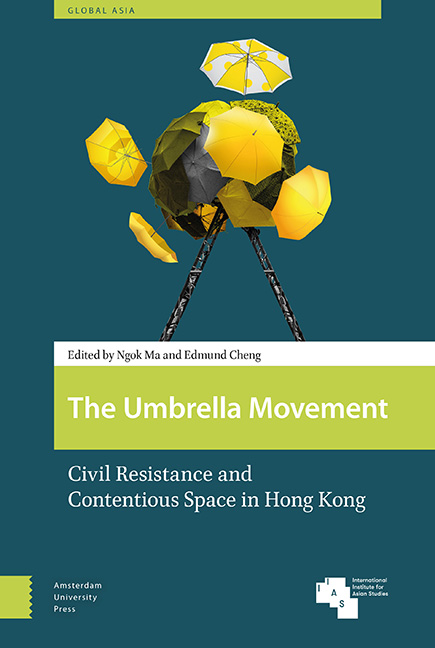Book contents
- Frontmatter
- Contents
- Acknowledgements
- Introduction: Civil Resistance and Contentious Space in Hong Kong
- Part A Trajectory and Contingency
- Part B Repertories and Strategies
- Part C Regime and Public Responses
- Part D Comparative Perspectives
- Appendix: The Umbrella Movement—Chronology of Major Events
- Index
- Publications/Global Asia
3 - Rude Awakening: New Participants and the Umbrella Movement
Published online by Cambridge University Press: 21 November 2020
- Frontmatter
- Contents
- Acknowledgements
- Introduction: Civil Resistance and Contentious Space in Hong Kong
- Part A Trajectory and Contingency
- Part B Repertories and Strategies
- Part C Regime and Public Responses
- Part D Comparative Perspectives
- Appendix: The Umbrella Movement—Chronology of Major Events
- Index
- Publications/Global Asia
Summary
Abstract
In-depth interviews of the Umbrella Movement's “committed occupiers” show that many of them were not veteran activists that had prepared for civil disobedience. Many of them were provoked into action by what they perceived to be undue police violence. Their anger allowed them to overcome the threshold of participation. The spontaneous nature of their participation partly explains the amorphous form of the movement, which had little centralized leadership, and some of their ambivalent attitudes concerning the movement's direction. However, the movement was a major experience of political awakening for many of these participants, which should create a new micro-cohort of participants for future movements.
Keywords: threshold for participation, political awakening, Umbrella Movement, political participation, biographical availability, Hong Kong protests
Introduction
The Umbrella Movement of 2014 was special in more ways than one. Despite the detailed planning and dragged-out deliberations surrounding the original Occupying Central with Love and Peace (OCLP) movement, the occupation movement broke out in a somewhat unexpected manner. The occupation movement did not take place at the originally scheduled time and site, but in a mostly spontaneous manner in reaction to police and government actions. This spontaneity meant that a large number of participants were not originally OCLP followers, although they might be largely sympathetic toward the democratic cause.
This paper, based on interviews in November 2014 with more than 50 committed occupiers at the three different occupation sites, seeks to explore and analyze the backgrounds and views of the participants of the Umbrella Movement. It shows that many committed occupiers had no prior plans to join the OCLP movement, and were not frequent participants in past pro-democracy activities. Police brutality was the chief provocation for their choice to join the movement. This more or less explained some of their behaviors and predispositions during the occupation: many of them were NOT followers of traditional or mainstream pro-democracy parties, so the appeals of party politicians had little influence on them or on the course of the movement. Many were relative newcomers to the democracy movement, which partly explained their mode of action and political inclinations. Despite their bold action of civil disobedience, they showed a fair degree of optimism about how the movement would end.
- Type
- Chapter
- Information
- Umbrella MovementCivil Resistance and Contentious Space in Hong Kong, pp. 77 - 98Publisher: Amsterdam University PressPrint publication year: 2019



